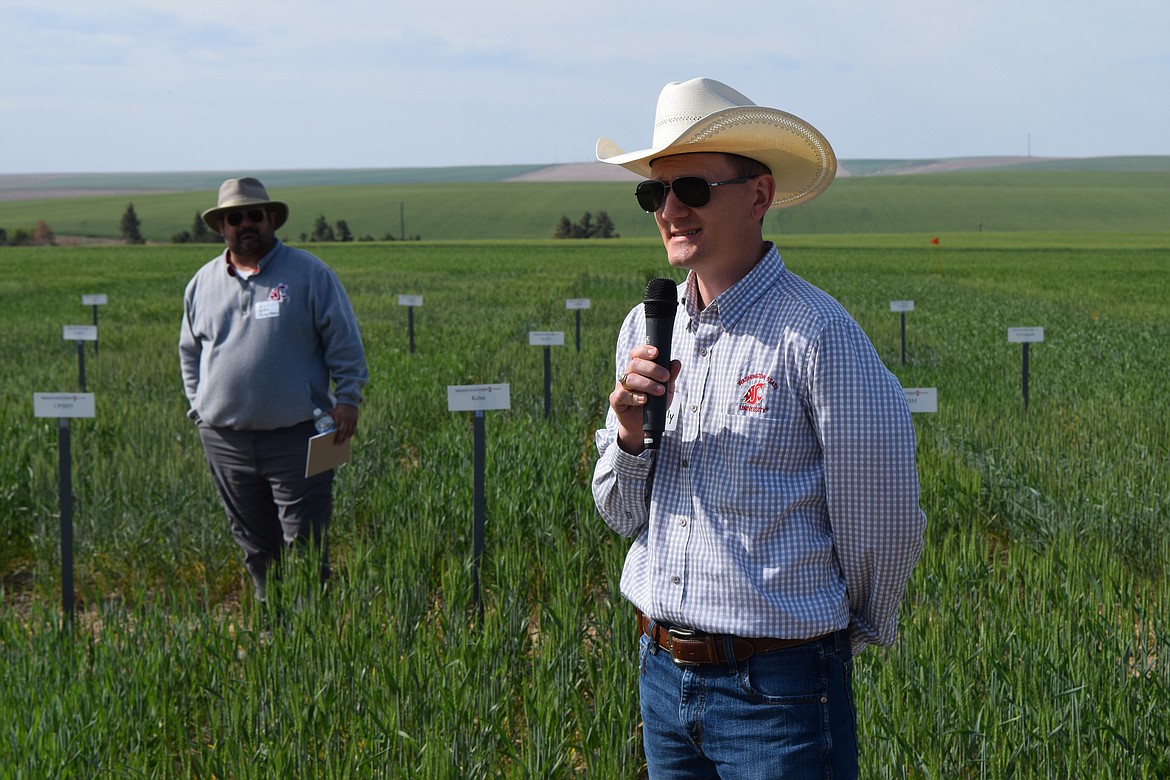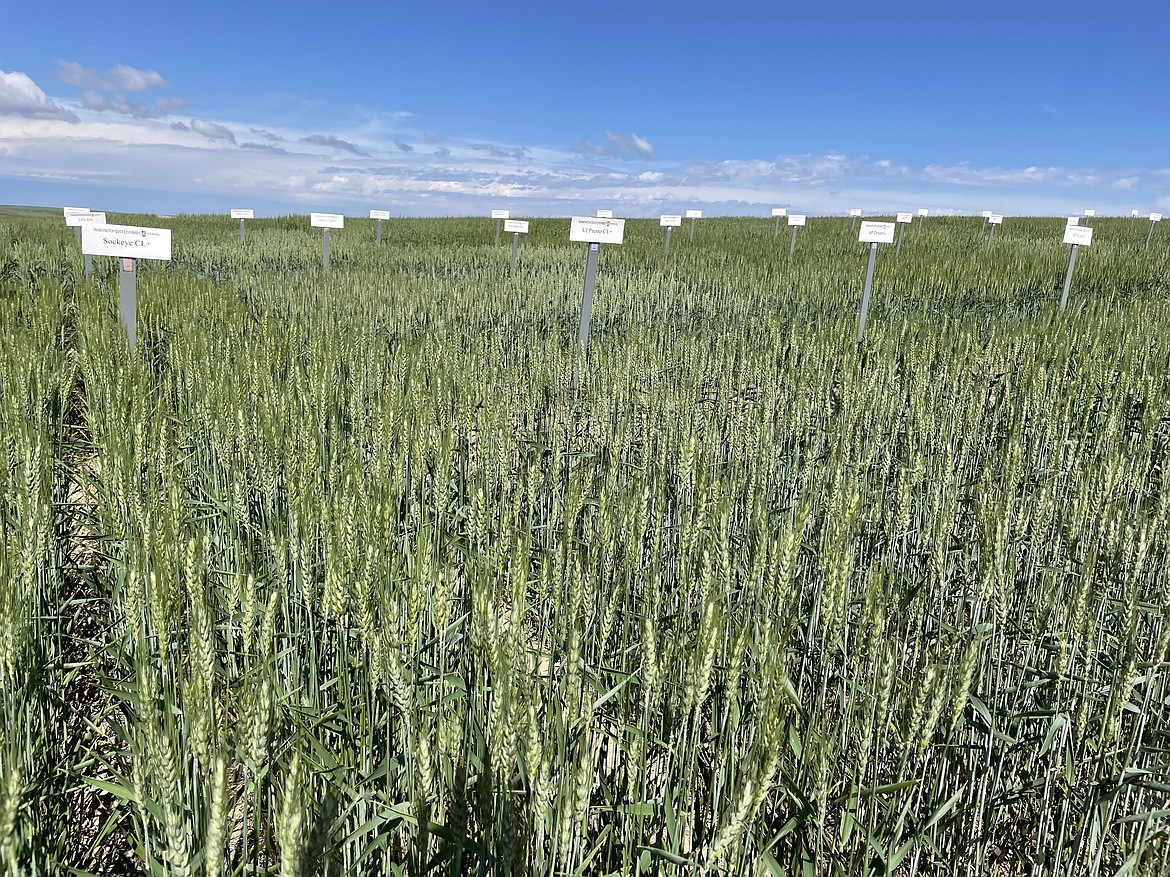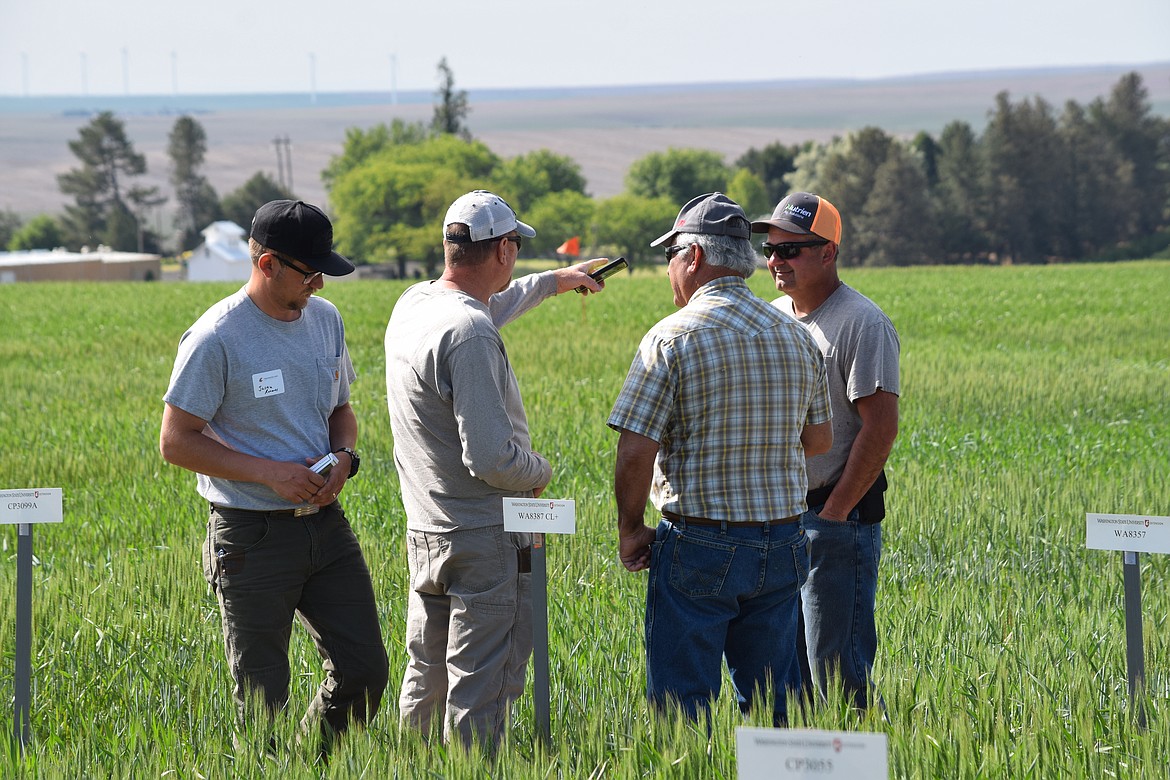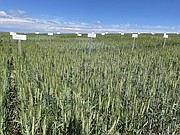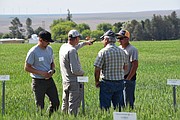Field day returns to WSU wheat farm
CHARLES H. FEATHERSTONE | Hagadone News Network | UPDATED 2 years, 10 months AGO
LIND — Washington State University wheat researcher Mike Pumphrey said that after last year’s drought and heat wave, he simply did not expect it to rain as much as it has this year.
“How much rain did you guys know we were going to get from about the 10th of March until now?” he asked. “You planned on wind. Did anybody plan on a bunch of rain?”
As he spoke, Pumphrey stood in the midst of a bunch of five-by-eight-foot test plots of spring wheat, all planted at WSU’s Dryland Research Station in Lind, surrounded by a group of farmers and other researchers. Pumphrey himself said he planned for another very dry year in 2022 and planted his wheat trials for the year near St. John, to guarantee he could get some rain.
According to its website, the Dryland Research Station received nearly three inches of rain so far this year from March 1 through the end of May, compared with a scant half-inch all spring and summer in 2021.
They all gathered on Thursday, June 16, at the station northeast of Lind for the station’s 2022 field day to review some of the latest trials of wheat varieties tailored for sprawling, dryland wheat farms of Adams, Lincoln and Franklin counties, as well to examine tests of oilseed rotation crops, learn about wheat diseases currently affecting the region, and get a look at a sensor-equipped sprayer designed to much more efficiently use herbicides to control weeds.
Because of the COVID-19 pandemic, it’s the first time in two years that WSU has hosted the field day tour at the station, according to Drew Lyon, WSU’s interim chair of the Department of Crop and Sciences.
“I would say this is our premier field day at Washington State University. And not being able to do it for two years was really kind of a bummer. So it's really nice to get back,” Lyon said.
The only other time in the station’s 107-year-history the field day visit was canceled was in 1980 following the eruption of Mount St. Helens.
Leonard Van Buren, a farmer and rancher near Kahlotus in Franklin County and president of the Franklin County Wheat Growers, said he came to the event this year to get some ideas for his farm as he prepares to take some of his land out of the U.S. Department of Agriculture’s Conservation Reserve Program.
“It’s going to be going back into wheat production and what have you, so we’re trying to figure out what maybe some of our options are, what we might be looking forward to in the next couple of years,” Van Buren said.
Researchers told tour participants that while this year’s rain was more than ample, the 10-12 degrees cooler-than-normal temperatures had put wheat development and maturation back about two weeks, and the wet and cold were providing opportunities for some wheat diseases that don’t normally plague dryland wheat fields in Central Washington.
“The good news is that we have resistance in a lot of the varieties that are adapted to the PNW,” said WSU plant pathologist Tim Murray about soil-borne wheat mosaic virus, which has been found in some wheat fields north of U.S. Highway 2. “We've known about this disease in the United States for over 100 years. Most of the Great Plains, the Midwest and the east, have dealt with this disease for a long time. There's a lot of efforts for breeding for resistance to this disease.”
Most researchers making presentations during the tour said they also delayed planting last year because of the drought, and that means the winter wheat isn’t going to provide the yields it normally would.
Pumphrey, however, told farmers that despite the two odd years — last year’s drought and this year’s cooler and wetter weather — researchers still have to consider the average climate in the various regions of Eastern Washington, that the dryland farms of the Columbia Basin are always going to get less rain than the Palouse, and wheat breeders need to account for that.
“The justification for the past few years is heat and drought tolerance,” he said. “Any time you show up to a testing site … any time you look at anybody’s data, you need to think about years, about broad adaptation and stability.”
Charles H. Featherstone can be reached at cfeatherstone@columbiabasinherald.com.
MORE FRONT-PAGE-SLIDER STORIES

'Wheat is king': Weather, disease, oil discussed at Dryland Institute field day
basinbusinessjournal | Updated 2 years, 10 months ago

WSU Lind Dryland Research Station welcomes new director
basinbusinessjournal | Updated 1 year, 10 months ago
ARTICLES BY CHARLES H. FEATHERSTONE

Potato prices up, sales down for first quarter 2023
DENVER — The value of grocery store potato sales rose 16% during the first three months of 2023 as the total volume of sales fell by 4.4%, according to a press release from PotatoesUSA, the national marketing board representing U.S. potato growers. The dollar value of all categories of U.S. potato products for the first quarter of 2023 was $4.2 billion, up from $3.6 billion for the first three months of 2022. However, the total volume of potato sales fell to 1.77 billion pounds in the first quarter of 2023 compared with 1.85 billion pounds during the same period of 2022, the press release noted. However, total grocery store potato sales for the first quarter of 2023 are still above the 1.74 billion pounds sold during the first three months of 2019 – a year before the outbreak of the COVID-19 pandemic, the press release said.

WSU Lind Dryland Research Station welcomes new director
LIND — Washington State University soil scientist and wheat breeder Mike Pumphrey was a bit dejected as he stood in front of some thin test squares of stunted, somewhat scraggly spring wheat at the university’s Lind Dryland Research Station. “As you can see, the spring wheat is having a pretty tough go of it this year,” he said. “It’s a little discouraging to stand in front of plots that are going to yield maybe about seven bushels per acre. Or something like that.” Barely two inches of rain have fallen at the station since the beginning of March, according to station records. Pumphrey, speaking to a crowd of wheat farmers, researchers, seed company representatives and students during the Lind Dryland Research Station’s annual field day on Thursday, June 15, said years like 2023 are a reminder that dryland farming is a gamble.

Wilson Creek hosts bluegrass gathering
WILSON CREEK — Bluegrass in the Park is set to start today at Wilson Creek City Park. The inaugural event is set to bring music and visitors to one of Grant County’s smallest towns. “I've been listening to bluegrass my whole life,” said the event’s organizer Shirley Billings, whose family band plays on their porch every year for the crowd at the Little Big Show. “My whole family plays bluegrass. And I just wanted to kind of get something for the community going. So I just invited all the people that I know and they’ll come and camp and jam.” ...

